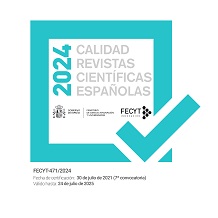Validation of the “International Consultation on Incontinence Questionnaire – Urinary Incontinence Short form (ICIQ-UISF) for the Portuguese population
Abstract
Introduction: Urinary incontinence can be considered a common condition associated with the aging process with extremely disabling symptoms, being two to three times more prevalent in women than in men. The use of validated instruments for the initial diagnosis of urinary incontinence is essential to obtain uniformity and systematization in the assessment of this condition. Objective: To adapt and validate the International Consultation Questionnaire Urinary Incontinence Short Form (ICIQ-UI SF) for the Portuguese population.
Methodology: Two independent translations of the ICIQ-UI SF were performed by Portuguese translators fluent in English. After harmonizing them, the resulting translation was independently back translated by two English translators fluent in Portuguese. The final version of the ICIQ-UI SF into Portuguese was applied to 90 users of the outpatient urology, urology and gynecology inpatient clinic of a hospital located in Gaia. The psychometric properties and reliability of the questionnaire were evaluated.
Results: No changes to the original format of the ICIQ-UI SF were observed at the end of the instrument's translation and adaptation process. The average age of participants was 55 years. Internal consistency was high, as demonstrated by Cronbach's alpha coefficient (0.85). Pearson's coefficient for questions 3 and 4 was 0.88 and for questions 4 and 5 it was 0.82. The evaluation was considered satisfactory and statistically significant.
Conclusion: The Portuguese version of the ICIQ-UI SF was successfully validated, making it possible to apply it to the Portuguese population with satisfactory reliability and construct validity.
Downloads
-
Abstract733
-
PDF (Español (España))1144
-
PDF (Português )1144
-
PDF1144
References
Hunskaar S, Burgio K, Diokno A, Herzog AR, Hjälmås K, Lapitan MC. Epidemiology and natural history of urinary incontinence in women. Urology. 2003;62(4 SUPPL. 1):16–23.
Wein AJ. Re.: An International Urogynecological Association (IUGA)/International Continence Society (ICS) joint report on the terminology for female pelvic floor dysfunction. J Urol. 2011;185(5):1812.
Irwin DE, Kopp ZS, Agatep B, Milsom I, Abrams P. Incontinence and Bladder Outlet Obstruction. 2010;2–8.
Azuma R, Murakami K, Iwamoto M, Tanaka M, Saita N, Abe Y. Prevalence and risk factors of urinary incontinence and its influence on the quality of life of Japanese women. Nurs Heal Sci. 2008;10(2):151–8.
O’Dell KK, Labin LC. Common Problems of Urination in Nonpregnant Women: Causes, Current Management, and Prevention Strategies. J Midwifery Women’s Heal. 2006;51(3):159–73.
Raz S, Rodríguez L. Female Urology. Female Urol. 2008;(January).
Tadeu Nunes Tamanini J, Dambros M, Arturo Levi CD, César Rodrigues Palma P, Rodrigues Netto Jr N, Tadeu Nunes Tamanini Rua Floriano Peixoto J. Validation of the “International Consultation on Incontinence Questionnaire-Short Form” (ICIQ-SF) for Portuguese [Internet]. Vol. 38, Rev Saúde Pública. 2004. Available from: www.fsp.usp.br/rsp
Klovning A, Avery K, Sandvik H, Hunskaar S. Comparison of two questionnaires for assessing the severity of urinary incontinence: The ICIQ-UI SF versus the incontinence severity index. Neurourol Urodyn [Internet]. 2009 Jun 1 [cited 2020 Jun 12];28(5):411–5. Available from: http://doi.wiley.com/10.1002/nau.20674
Avery K, Donovan J, Peters TJ, Shaw C, Gotoh M, Abrams P. ICIQ: A brief and robust measure for evaluating the symptoms and impact of urinary incontinence. Neurourol Urodyn. 2004;23(4):322–30.
Guillemin F, Bombardier C, Beaton D. Cross-cultural adaptation of health-related quality of life measures: Literature review and proposed guidelines. J Clin Epidemiol. 1993;46(12):1417–32.
Kong H, West S. Declaração de Helsínquia da Associação Médica Mundial Princípios Éticos para a Investigação Médica em Seres Humanos. 2008;1–4.
Bryman, Adam; Duncan C. Quantitative Data Analysis with IBM SPSS 17 18 & 19: A Guide for Social Scientist. Routledge: Taylor & Francis Group; 2011.
Abrams P, Cardozo L, Fall M, Griffiths D, Rosier P, Ulmsten U, et al. The standardisation of terminology in lower urinary tract function: Report from the standardisation sub-committee of the International Continence Society. Urology. 2003;61(1):37–49.
Buckley BS, Lapitan MCM. Prevalence of urinary incontinence in men, women, and children-current evidence: Findings of the fourth international consultation on incontinence. Urology [Internet]. 2010;76(2):265–70. Available from: http://dx.doi.org/10.1016/j.urology.2009.11.078
Dolan LM, Walsh D, Hamilton S, Marshall K, Thompson K, Ashe RG. A study of quality of life in primigravidae with urinary incontinence. Int Urogynecol J. 2004;15(3):160–4.
Nunes Tamanini JT, Dambros M, D’Ancona CAL, Rodrigues Palma PC, Rodrigues Netto N. Validation of the “International Consultation on Incontinence Questionnaire - Short Form” (ICIQ-SF) for Portuguese. Rev Saude Publica. 2004;38(3):438–44.
Souza AC de, Alexandre NMC, Guirardello E de B. Propriedades psicométricas na avaliação de instrumentos: avaliação da confiabilidade e da validade. Epidemiol e Serv saude Rev do Sist Unico Saude do Bras. 2017;26(3):649–59.
The works published in this magazine are subject to the following terms:
1. The Publications Service of the University of Murcia (the publisher) preserves the copyright of the published works, and encourages and allows the reuse of the works under the license for use stated in point 2.
© Servicio de Publicaciones, Universidad de Murcia, 2011 (© Publications Service, University of Murcia, 2011)
2. The works are published in the electronic edition of the journal under Creative Commons Reconocimiento-NoComercial-SinObraDerivada 3.0 España(texto legal) “ a Attribution-NonCommercial-NoDerivatives 3.0 Spain license (legal text)”. They can be copied, used, broadcasted, transmitted and publicly displayed, provided that: i) the authorship and original source of their publication (journal, publisher and URL) are cited; (ii) are not used for commercial purposes; iii) the existence and specifications of this license is mentioned.
3. Conditions of self-archiving. Authors are allowed and encouraged to electronically disseminate the pre-print (pre-reviewed ) and / or post-print (reviewed and accepted for publication) versions of their works prior to publication, as it ensures a wider circulation and dissemination which may lead to a possible increase in its mention and a higher scope among the academic community. RoMEO color: green.












